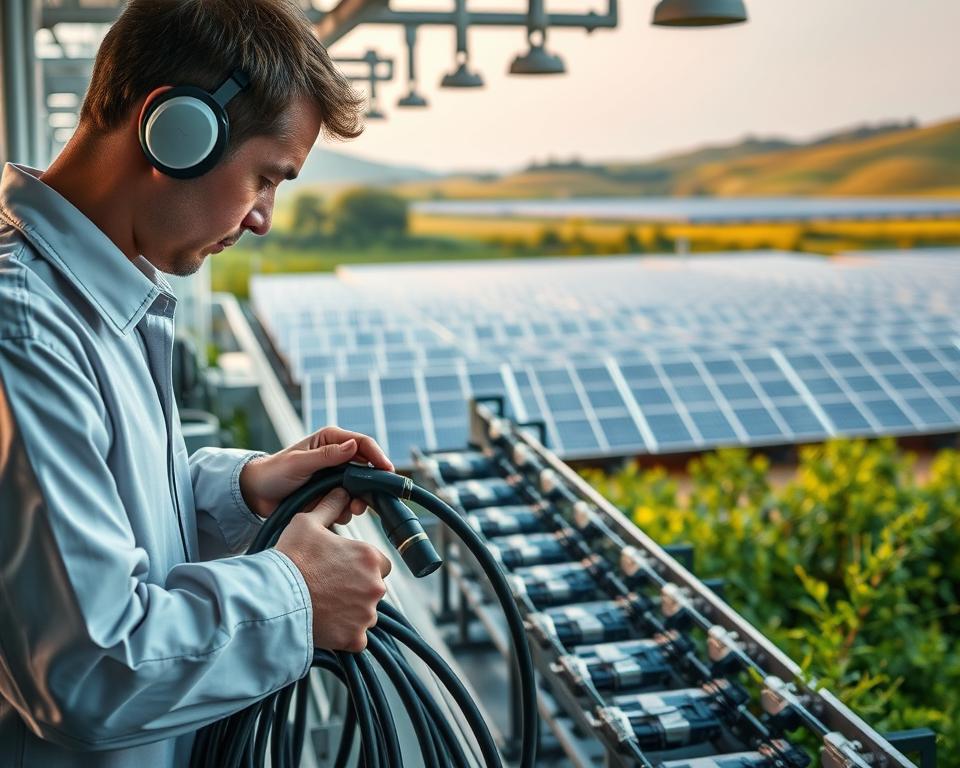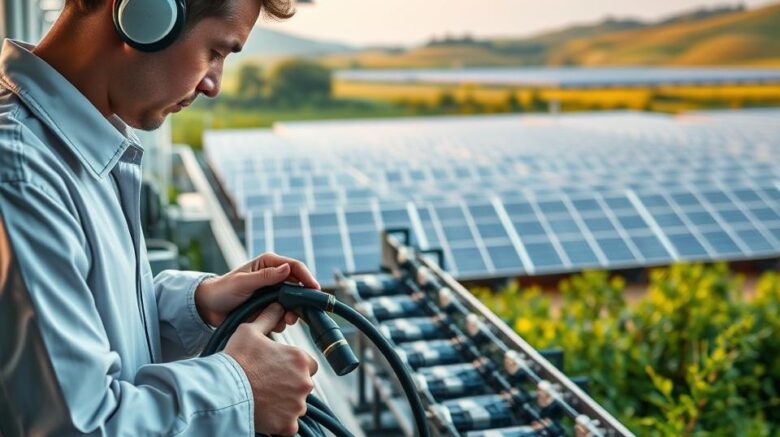Best EV Charging Cable Manufacturers for Your EV
The electric vehicle industry is on the rise, with the demand for trustworthy and efficient charging solutions growing exponentially. Currently, leading companies have been at the forefront of this change, providing premium charging infrastructure. Southwire, for instance, entered the market in 2014 and excels, boasting over 1000 five-star reviews and a 75-year legacy in electrical construction.
The rise in electric vehicle adoption drives demand for long-lasting, quick, and reliable EV Charger Manufacturers. Top manufacturers are developing to meet these evolving needs, offering products that enhance the overall charging experience.
Grasping the distinctions between various charging solutions matters for making informed decisions. Quality charging infrastructure directly impacts vehicle performance and customer satisfaction.
Major Highlights
- Leading brands provide premium cables that boost durability and security.
- The demand for efficient charging infrastructure is on the rise with the growth of the electric vehicle market.
- Industry leaders develop cutting-edge products for EV drivers.
- Premium cables enhance both charge rate and vehicle function.
- Opting for top-tier cables yields future savings.

Why High-Quality EV Cables Matter
With EVs on the rise, the importance of top-grade EV charging cables is undeniable. The efficiency, safety, and dependability of electric vehicle charging systems depend heavily on the quality of the charging cables used.
Advancements in EV Charging
Charging tech for EVs has evolved rapidly, with a priority on speedy charge times and improved safety features. Modern EV charging cables are designed to meet these evolving needs, featuring superior materials and construction techniques to minimize energy waste and maximize transfer rates.
The Case for Premium Charging Infrastructure
Quality charging cables directly impact the overall performance and safety of EV charging infrastructure. Robustness, such as all-weather performance and temperature tolerance, ensure reliable operation across various environments. Additionally, meeting standards and following protocols are essential in guaranteeing safe operation.
| Key Features | Benefits |
|---|---|
| High-grade build quality | Minimized power loss during energy transfer |
| Robust durability | Weather resistance, flexibility in extreme temperatures |
| Regulatory compliance | Rigorous safety requirements met |
| Maintainability | Long-term value proposition, reduced waste |
Our high-performance cable solutions, such as those offered by Aichie Tech Electronics, are tested for quality and compliance in The Cable Lab. Choosing maintainable Portable EV Charger, repairable designs reduce lifetime costs, lowering environmental impact.
Premier Chinese EV Cable Suppliers
A surge of cable makers in China supports the EV boom. They play a key role in global EV infrastructure, offering premium charging cables designed for different applications.
Wottz: Industry Leaders Since 2014
Wottz has been a leading cable manufacturer since 2014. They offer a range of cables that cover Mode 1–4 charging standards, from Mode 1, 2, 3, and DC Fast Charging (Mode 4).
Aichie Tech Electronics – 75 Years in Electrical Solutions
Aichie Tech Electronics leverages 75 years of electrical expertise in its EV cables. Their products are designed to meet the demands of both domestic and commercial EV charging infrastructure.
More Leading EV Cable Brands
Beyond industry leaders like Wottz and Southwire, other manufacturers are making their mark by focusing on specific automotive applications or technological innovations in electric vehicle charging. These include specialists in Type 1 (J1772) and Type 2 (Mennekes) connectors, as well as companies developing cables with enhanced flexibility and resistance to environmental factors.
Types of EV Charging Cables Explained
As electric vehicles become increasingly popular, understanding the various types of EV Charging Cable Manufacturers is crucial for optimal charging experiences. Different cables suit different charging needs. The variety in EV charging infrastructure demands a closer look at the cable options.
Type 1 vs Type 2 Explained
SAE J1772 (Type 1) and Mennekes (Type 2) are the main global standards. Type 1, also known as SAE J1772, is North American standard, while Type 2, or Mennekes, is the standard in Europe. The right cable matches your car and charger. Type 2 cables often support higher charging capacities, making them ideal for speed.
Level 2 & Fast DC Cables
Level2 charging cables offer faster charging than Level1, using 240V AC power to deliver up to 19.2 kW of power. DC Fast Charging cables, on the other hand, enable quick top-ups by on-site AC→DC conversion, delivering rapid fill-ups. These cables are key for highway charging, letting EVs charge in minutes.
Portable and Tethered Cable Options
Granny chargers plug into home outlets for emergency use. Tethered cables are attached permanently, providing a convenient but less flexible charging solution. The choice comes down to flexibility vs convenience.
When selecting an EV charging cable, factors such as cable length, charging speed, and compatibility with the vehicle are crucial. For instance, portable charging cables range from simple L1 cords to full L2 kits. Vehicle-to-load (V2L) cables represent an emerging category, enabling EVs to power external devices.
- Portable charging cables offer flexibility, with options ranging from basic to more robust Level2 solutions.
- Fixed cables add convenience, removing cable management tasks.
- Lengths vary from 5 m to 50 m—choose wisely.
Attributes of Premium EV Cables
High-quality EV charging cables are distinguished by several key features that ensure reliable and safe charging. These features are vital to safe, efficient charging.
All-Weather Durability
Cables must withstand rain, sun, and cold. Manufacturers like Wottz and Southwire craft their cables from recyclable materials that adhere to ROHS compliance, ensuring they withstand various environmental conditions. Their serviceable design facilitates easy maintenance and promotes recycling.
Flexibility and Ease of Use
Flexibility and ease of use are also critical factors. High-quality EV charging cables are built for easy handling without sacrificing strength. This flexibility is combined with rugged construction for lasting performance.
Regulatory Approvals
Safety certifications and compliance with international standards are non-negotiable for reputable EV charging cable manufacturers. They ensure their products meet or exceed standards such as IEC62196 for connectors and UL2594 in North America. Independent labs verify safety, toughness, and weatherproofing.
| Certification | Description | Region |
|---|---|---|
| IEC62196 | Connector safety standards | International |
| UL2594 | Standard for electric vehicle supply equipment | North America |
| ROHS | Restriction of hazardous substances | International |
Emphasizing these attributes yields cables that are safe, durable, and user-friendly.
Cutting-Edge EV Cable Innovations
The latest developments in EV charging cable technology are revolutionizing the way we charge our vehicles, with a focus on speed, improved signal integrity, and sustainable compounds.
Liquid-Cooled Charging Cables for Ultra-Fast Charging
Cooling fluids enable higher charge rates, minimizing thermal throttling during high-power sessions.
Signal-Boosting Contact Designs
Hyperboloid contact points improve electrical connection, ensuring stable communication and power flow.
Green Charging Cable Designs
Leading manufacturers are prioritizing sustainability in their cable designs, minimizing ecological footprint with RoHS-compliant, serviceable builds. For instance, companies like Aichie Tech Electronics and Wottz are embracing repairable designs and strict standards to foster reuse.
The industry’s shift towards sustainability includes the use of TPU jackets, avoidance of hazardous substances, and the development of take-back programs for end-of-life disassembly and material recovery.
Choosing the Perfect EV Cable
Selecting the proper cable ensures optimal performance. To make an informed decision, consider several key factors.
Compatibility with Your Electric Vehicle Model
Verify your car’s inlet and cable plug match. Your vehicle’s onboard charger capacity determines the maximum AC charging rate it can accept.
Length Considerations
Select a cord length based on parking and outlet location. A longer cable provides more flexibility but may be heavier and less manageable.
Matching Power and Speed
Ensure cable amperage aligns with charger and car. Standard Level 2 home charging operates at 7.2 kW, but some vehicles support up to 19.2 kW with appropriate electrical service.
By considering these factors, you can select an EV charging cable that meets your needs and enhances your overall charging experience.
Conclusion: Investing in Quality EV Charging Infrastructure
With EV growth unabated, premium cables are essential. Choosing cables from Wottz or Aichie Tech Electronics provides long-term value and reliability. Their serviceable designs enable repairs over replacements to cut waste. This approach supports eco-friendly EV use.
By choosing high-quality charging solutions, EV owners can enjoy peace of mind knowing their equipment is certified and compatible with future advancements.
